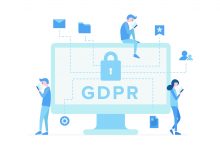With the General Data Protection Regulation (GDPR) now implemented in the European Union, companies now find themselves in the midst of an unprecedented and challenging data landscape. The affect which GDPR may have on big data and the way companies use personal information may potentially be seismic. So where do we go from here?
Onwards and upwards, would be the answer. This regulation is the first step towards establishing order out of chaos in the digital age. GDPR will effectively give consumers more control over who holds their data and how it is processed.
While the media in Europe focuses on the general apathy of the common consumer when it comes to GDPR, privacy activists are celebrating a victory of sorts. The bombardment of emails from companies requesting consent for data processing have been peppering the average European’s inboxes over the past week or so. This has led to synchronized head-scratching across the continent, which some campaigners are only happy to highlight for their own gains.
Therefore, it is likely that the relationship between some companies and the individual has irreversibly changed with the implementation of GDPR. Institutions which could maintain a stance of relative anonymity to the consumer – ironically enough – must now let their presence and intentions be known. More than this, they must ask for consent to sustain the fundamentals of the distant relationship they had prior to May 25.
Going forward, not every company will be able to maneuver their position when it comes to collecting data with ease. In comparison, a company such as Focused Collection – which stocks trending images and offers a bright business solution – will naturally find it easier to navigate this path. By nature, creative and pioneering companies carry a softer and more tactful approach to data collection in comparison to legacy industries like banks and similar outfits, which predate but rely heavily on the tech industry.
So why is this? Well, it would come down to a number of factors which are punctuated by necessity. Consumers are aware and accepting of a financial institution’s requirement for basic data such as birth dates, addresses, and identification. Just how that company knows their consumer habits and how far they are in their pregnancy is the worry. With other companies – especially those in the manufacturing and healthcare industries – there will be an enhanced paranoia with some that the way their personal data is being processed can come back to bite them in the butt.
The perceived unmasking of big data and its nefarious intentions before the eyes of the docile masses is what is being pushed by campaigners right now. The idea of capitalism homogenizing society off the back of data organization is the stone with which they sharpen their swords. The problem for these crusaders is that big data is the oil which fuels the capitalistic engine, and this is inexorable. Rather than drive a spear through the heart of the machine, it seems that they will, for now, settle for inadvertently leading to the necessity for new ideas and a modified model.
For companies who perceive GDPR as a negative, crushing enforcement, the risk is that they will be surpassed by companies which have embraced it as an opportunity. This can essentially be a chance for businesses not just to splash out on ensuring compliance with the regulation, but to focus on engaging more with the individual. You want an opportunity to get the consumer’s attention? Here it is! The institutions which use GDPR in their favor are likely to be the ones that gain from it.
For many, big data is a term which has evaded their consciousness, despite it being around for quite some time. Across the bloc, consumers are being forced to enter passwords, agree to changes in terms and conditions, and provide explicit consent for companies to hold and process personal data. Could signing up for that health camp in 2015 mean that your personal information is being used to target you without your knowledge? Perhaps, but while Thomas in accounting did agree to that in principle – and it was not unlawful at that time – it is now.
By acting now – and ensuring the PR department and most creative minds within the business are firing off on all cylinders – companies can earn even more data, which gives them a huge head start over rivals. By establishing the foundation of trust, this is even more achievable than without GDPR.
In an entrepreneurial sense, it allows companies to rejuvenate the importance of customer experience. From here, the promotion of convenience to the individual can bolster the data and information that person is likely to want to hand over. It is a win-win situation for companies who capitalize on the drive to bring the individual out in big data.
The post Big Data & GDPR: A huge opportunity for businesses to outshine competition? appeared first on Big Data Made Simple – One source. Many perspectives..
